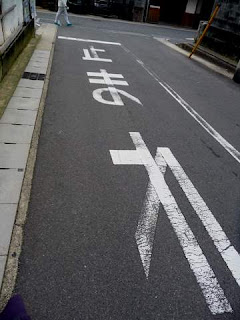Today I would like to write about the topic that has been on mind for a very long time. The problem of garbage recycling is somehow neglected by Westerners. The truth is that most of us know about the responsibility for our natural environment but few of us really are concerned about this topic. Some people actually recycle plastic bottles, but their devotion is considered eccentric.
But not in Japan where you recycle everything and everywhere. I spent my first days in Japan on studying the garbage separation and disposal. It was a request from the reception office of my building to comprehend this strange garbage philosophy. On the other hand the Japanese love cartoons so every flayer has somehow childish (for us) design. So Ms. Panda shows how to segregate PET bottles and Mr. Piggy helps her with exceptions. Mr. Bunny teaches us how take care of breakable things and lovely gay couple of Mr. Kitty and Mr. Doggie instruct us about dead bodies of our sweet pets.
Generally one should be aware of 6 categories among which burnable, non-burnable and PET bottles are the only ones I understand. It's not better on the street where normal trashcans are as unique as geishas, so often if I don't a bin I need I have to bring everything home, where I can segregate it properly. Sometimes when you are lucky you might find one called 'OTHERS' where you can throw almost everything... But these are rare examples in the Country of impeccable cleanliness
Ps. Because some of my relatives demanded translations of my blog, from now on I my blog will be bilingual
POLISH
Szanuj śmieci Swoje
Dziś poruszę temat, który od jakiegoś czasu chodzi mi po głowie i myślę, że warto się nim podzielić.
Większość z nas, ludzi Zachodu, sprawę śmieci traktuje marginalnie. Fakt, każdy z nas słyszał o odpowiedzialności za środowisko naturalne. Ba, co niektórzy nawet segregują plastikowe butelki i inne odpadki, ale ta swego rodzaju ofiarność, wciąż uchodzi za mniejsze/ większe ekologiczne curiosum.
Nie w Japonii. Tu segreguje się wszystko i wszędzie. Moje pierwsze dni w kraju Wschodzącego Słońca spędziłem na studiowaniu powyższej instrukcji. Zostałem poproszony dość imperatywnym tonem przez recepcję mojego budynku o dokładne zapoznanie się zasadami japońskiej śmieciowej filozofii (jak nie religii). Z drugiej strony miłość do kolorowych rysuneczków sprawia, że każda tutejsza instrukcja jest nacechowana bajkowym klimatem. Panda pokazuje co zrobić z plastikami, Świnka jej wtóruje. Króliczek przestrzega przed przedmiotami, które mogą się zbić. Kotek i piesek zaś z ochotą mówią o recyklingu zwłok domowych pupili. Ogólnie śmieci należy podzielić na te do spalenia, niepalne, plastiki... I jeszcze 3 inne kategorie, któych mój rozum nie pojmuje. Na ulicy nie jest lepiej. Normalny pojemnik na śmieci to marzenie i jak nie znajdę odpowiedniego kontenera to jestem zmuszony targać wszystko ze sobą do domu. Czasem z radością można znaleźć śmietnik znapisem 'INNE' gdzie można wrzucić praktycznie wszystko... Ale to tylko nieliczne wyjątki w tym kraju nienaganej czystości.













































